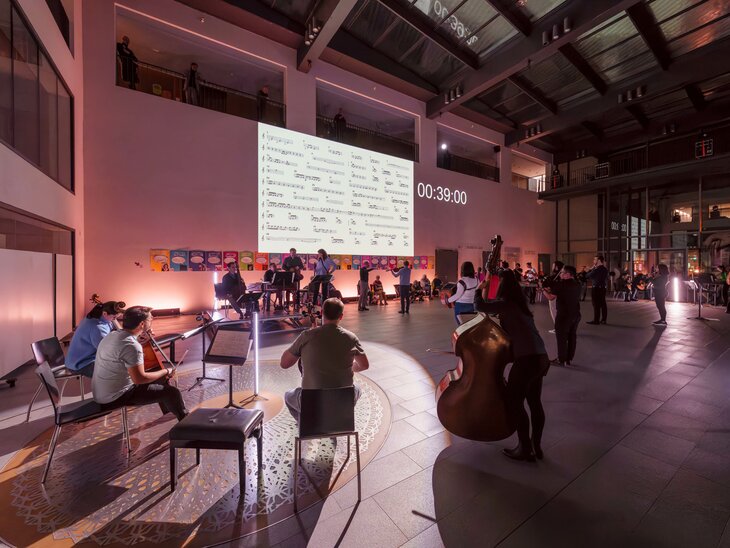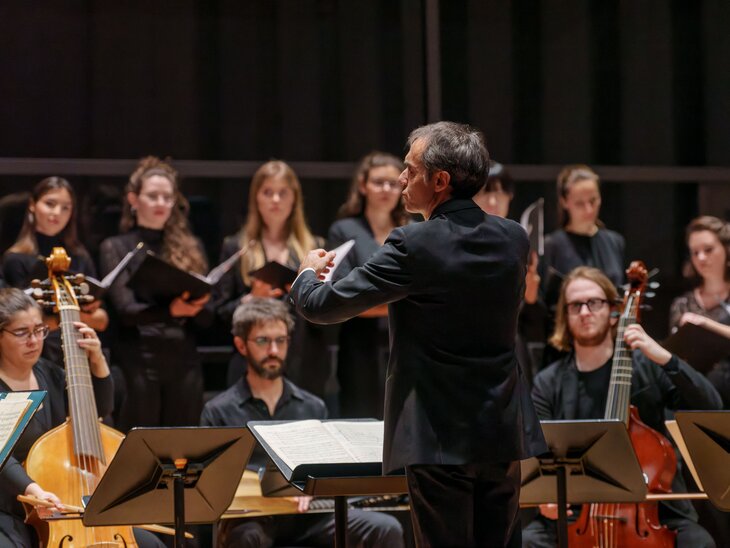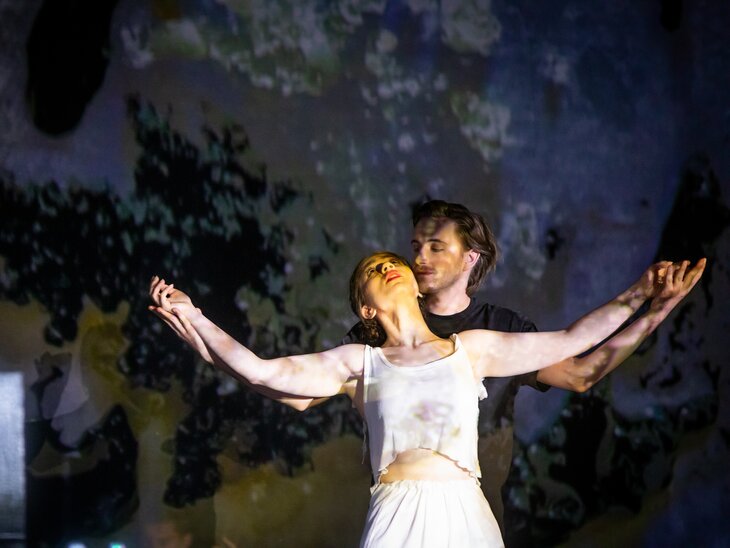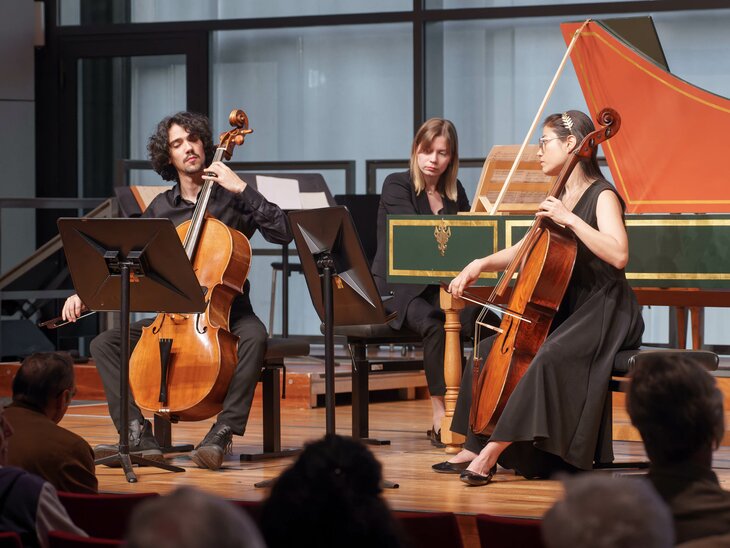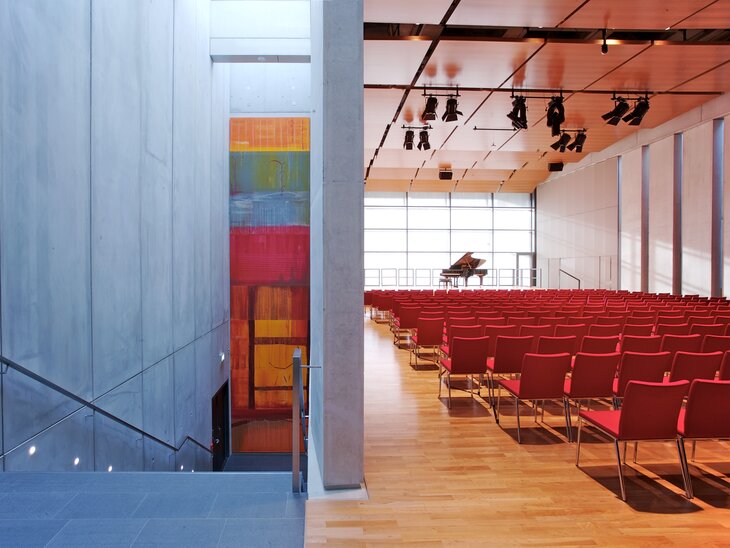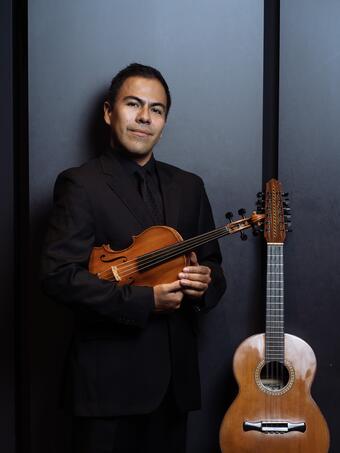Baroque oboe
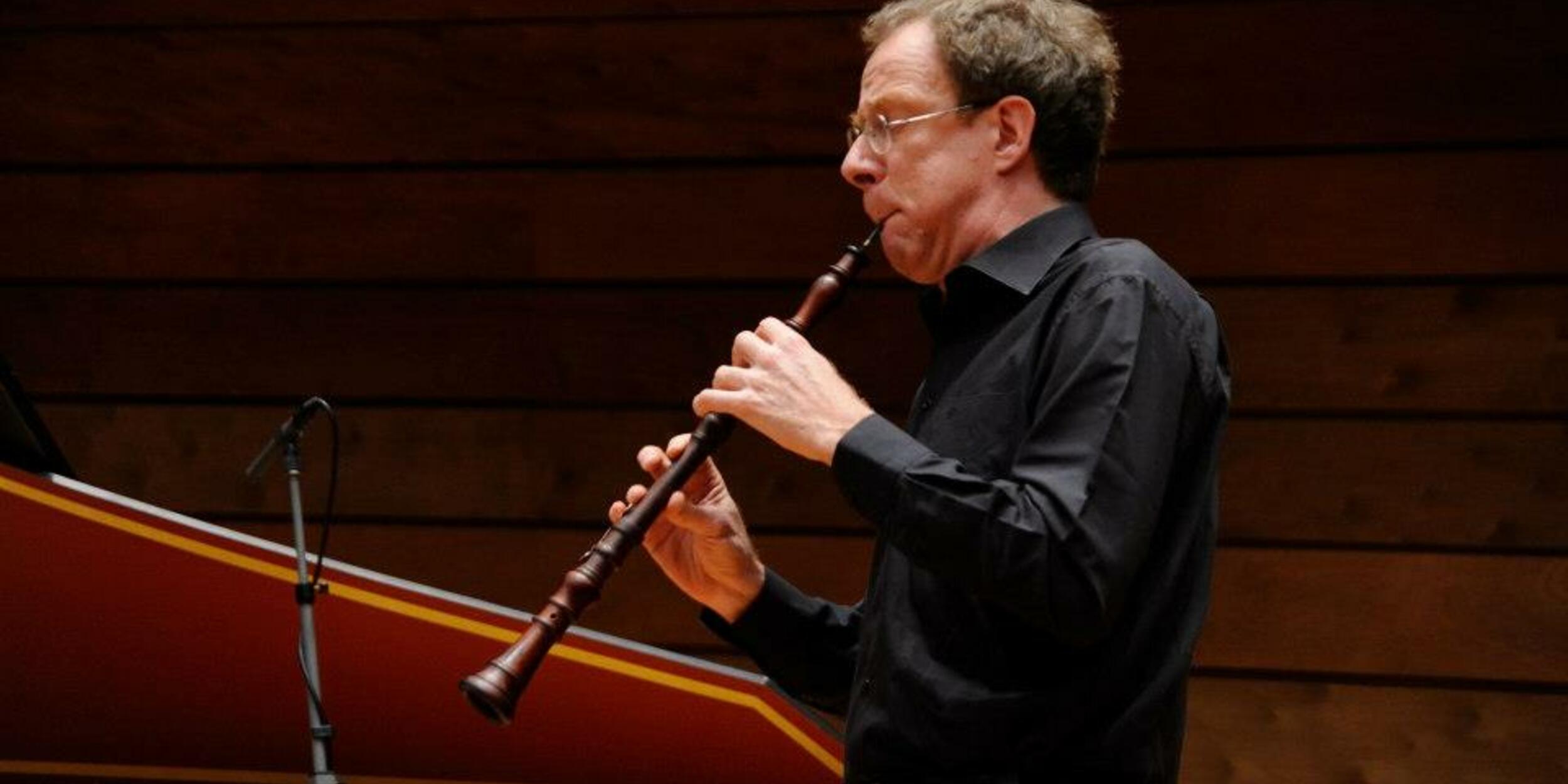
Overview
This course is a comprehensive and broad-ranging degree programme that prepares students for a professional career as a baroque oboist. It equips students to engage with musical concepts and content, reflect on the contexts of different interpretations, and study and publicly perform the music of different periods using their knowledge of stylistics and performance practice.
Department for Studies and Examinations
+43 676 88122 492 studienabteilung@moz.ac.at
Length of course
8 semesters / 240 ECTS-AP
Language
German
Registration deadline
1.2.–28.2.2024
Auditions
summer semester each year
to the dates
Downloads
General Information
This degree course is oriented around current developments and performance practice in the arts, as well as the latest, most up-to-date research in the academic disciplines involved. The goal of the BA in Performance is the practice-oriented and academically sound professional preparation for the following fields:
- Soloist
- Chamber musician
- Orchestral musician (e.g. in chamber/opera/symphony orchestras, orchestras and ensembles for contemporary music, ensembles for historical instruments)
- Freelance artist
The goals of the BA in Performance at the Mozarteum University are artistic maturity and independence, critical self-reflection and evaluation, and the artistic and scientific ability to interpret musical works from all periods. The BA in Performance will equip students to pursue their chosen profession and to fulfil artistic, pedagogical and organisational tasks within cultural life.
The curriculum is competence-oriented. After completing the Bachelor's programme, students should:
- be able to master their instrument and present themselves professionally
- be free and independent in their artistic work
- be able to deal critically with artistic and academic issues
- be able to play professionally in an orchestra/ensemble
- be able to work as a team-player in an artistically constructive way as a member of a chamber music formation or ensemble
- have acquired comprehensive knowledge of various playing techniques
- have acquired comprehensive knowledge of the orchestral literature and mastery of the relevant orchestral parts and the solo and chamber music literature of various periods
- have basic knowledge of stylistics and repertoire
- have gained insight into the literature and performance practice of both early and contemporary music
- have acquired comprehensive knowledge of music theory and musicology and be able to apply this in practice
- have mastered the basics of academic work and be able to analyse, interpret and write about artistic content in a grounded manner
- be able to use audiovisual media for self-presentations (such as competition submissions, demo recordings, internet presentations etc.)
- have gained insights into the areas of physical and mental health maintenance, self-management and performance optimisation
- have further developed their individual interests beyond their own subject area through targeted selction of elective subjects in the spirit of lifelong learning
The eight-semester bachelor's degree programme is modular in structure. Each module comprises teaching and learning content that has been combined to form thematically and didactically meaningful units of study. The names and content descriptions (study objectives) of the individual modules, the number of ECTS credits to be achieved for each module, and the type of performance assessment are specified in the curriculum. The module descriptions refer to the corresponding learning outcomes and competencies. The Bachelor's program is a face-to-face program and cannot be offered - not even in part - as a distance learning program. The courses from the Principal Study, as well as in other One-to-One Tuition, are designed to build upon each other. Prerequisite for enrolment in courses from the Principal Study or One-to-One Tutition is a positive evaluation of the previous semester (from the second semester onwards).
The curriculum provides an overview of the courses to be completed, which are grouped into modules.
The courses are visible online in Curriculum Support:
A prerequisite for beginning a bachelor's degree (BA) is passing an audition. Auditions take place once a year and consist of various partial exams. All information about the audition can be found under “Information about the admissions procedure” further down the page.
A high school diploma is not necessary.
PLEASE NOTE: You can only apply for study programmes for which you have not yet obtained a degree!
Students of the Bachelor's programme are encouraged to complete a semester abroad. Semesters 5 and 6 of the degree programme are particularly suitable for this. In addition to subject-specific competences, a study period abroad can also lead to the acquisition and deepening of:
- Subject-specific foreign language skills
- General foreign-language skills (language comprehension, conversation, etc.)
- Organisational skills, through independent planning of everyday student life in international administrative and university structures
- Knowledge about international study systems, as well as broadening one's own subject perspective
- Intercultural competences
Examinations and assessments taken during studies abroad can be approved by the Director of Studies as equivalents to compulsory subjects, elective sujects or free elective subjects required by the Mozarteum University for your degree course. The documents required for the approval procedure are to be submitted by the applicant immediately after their exchange semester.
Details at International Affairs.
Information on the Admissions Process
The prerequisite for admission to a bachelor's degree program (BA) is passing the audition. Application for an audition takes place online.
PLEASE NOTE: You can only apply for a study programme for which you have not yet obtained a degree!
Applicants are then invited to an on-site audition, which consists of several partial examinations.
Registration takes place via the application portal [Link], where you must first create an application account. Please note that the automatic email to activate the account can often be found in the spam folder, so please be sure to check there if you think you have not received it. If you still have problems activating your account, please contact studieninfo@moz.ac.at.
Please ensure that you can be reached at the email address entered in your profile throughout the entire application process. If there are any changes, please update your profile yourself.
The programme presented must include pieces typical of the baroque oboe repertoire, taking into account technical and stylistic diversity.
The following works are to be prepared:
- a partita from the "Kleine Kammermusik" by G.P. Teleman
- three to five movements from the suite in G minor by Anne-Danican Philidor
- a work of free choice
Playing by heart is not required. The entrance exam is to be completed on a baroque oboe. Playing the modern oboe is not permitted.
The candidate can bring a contiuno player if they wish, but a harpsichordist and a harpsichord in A=415 Hz are available.
Examination in basic knowledge of general music theory (written and oral), including an aural test.
Requirements in the written part of the examination (approx. 60 minutes):
• Notation of melodies from memory
• Continuation of given melodies
• Composing a short melody to a given text
• Noting down one-part and easy two-part melodic dictations as well as rhythmic dictations
• Forming all triads and seventh chords including inversions (especially dominant-seventh chords in root position and 3rd inversion)
• Recognising and notating simple figured basses as well as harmony functions and harmony steps in a musical context
Requirements in the oral part of the examination (5-10 minutes):
• sight-reading
• Listening to and naming intervals and simple chord progressions
• Singing triads (in inversions) and dominant seventh chords (in root position only)
• Listening to harmonic steps and dissonant neighbour notes
• Extended cadence in major and minor in two different keys (on piano or guitar)
You can find an example of the exam as well as further help for preparation HERE.
Audition lasting approx. 10 minutes. The programme must consist of two pieces in different styles. The following examples illustrate the level of difficulty expected:
Harpsichord:
- J.S. Bach: Notenbüchlein für Anna Magdalena
or Piano:
- J.S. Bach: Notenbüchlein für Anna Magdalena
- J. Haydn: Sonatas in C major, G major or F major (HOB: XVI: 7, 8 and 9)
- R. Schumann: Album für die Jugend, Op. 68
All applicants whose first language is not German must prove their German skills by the time of enrolment at the latest.
- Required language level: at least A2 (Common European Framework of Reference for Languages GER 2001)
- Information on the approved language certificates can be found HERE
After passing Partial Examination A, candidates will be admitted to Partial Examinations B-D (possibly in a different order). The repetition of the Partial Examinations A-C in case of failure is not permitted. The audition can only be repeated in its entirety and only in the next academic year. The audition can be repeated an unlimited number of times.
- Online registration for an audition during the application period via the registration portal for applicants
(PLEASE NOTE: Registration is only possible after submission of all required documents!) - Participation in an on-site audition in May/June
- Upon passing the audition: invitation to enrol in the degree programme
- Enrolment during the general admission period
Please note that the Mozarteum University Salzburg offers various support options at the time of your audition and during your studies if you have a disability or a chronic illness.
If this applies to you and you would like to take advantage of counselling, please contact Claudia Haitzmann: claudia.haitzmann@moz.ac.at oder +43 676 88122 337.
Any questions?
Here you can find more information about starting your studies:
